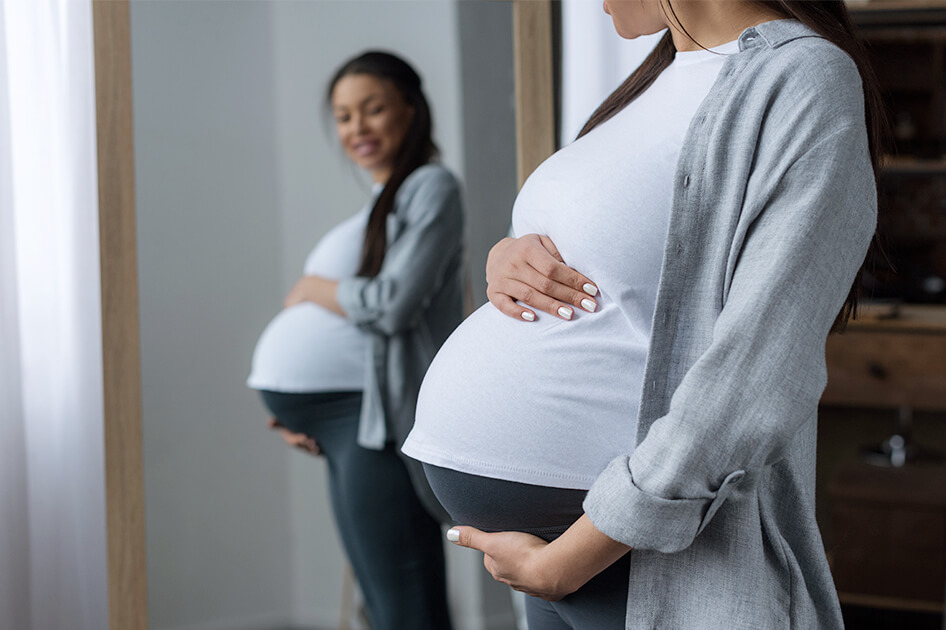
Pregnancy and body image
Pregnancy causes many changes in your body. Some of these changes can be difficult to deal with or very uncomfortable. Also, after giving birth, your body may take a while to get back to the way it was before, or it may never completely return to the way it looked before pregnancy. Although these changes are natural, some women may struggle with keeping a positive body image during and after pregnancy. You can learn ways to cope with feelings about your body's changes during and after pregnancy.
How does pregnancy affect body image?
For some women, pregnancy can cause body image problems they did not have before or make body image problems worse. During pregnancy, your body goes through several changes, including weight gain. Hormonal changes will cause your stomach and breasts to get larger as the baby grows and your body prepares for breastfeeding. You might develop stretch marks where your body gets larger. Sometimes your skin will break out with acne. You may also be much more tired than usual and have mood swings more often. A negative mood may make you more likely to have unhealthy or negative thoughts about your body.
Being comfortable with your body before pregnancy can help you get through the physical and emotional changes during pregnancy. Learn more about how to improve your body image.
How can I love and accept my pregnant body?
Women’s bodies are amazing for the ability to nourish and deliver a baby. Some of the body changes that come with pregnancy are uncomfortable, but they all support your growing child. Pregnancy does not last forever.
- Focus on the positive work your body is doing. Your body is changing to help your baby grow and develop. This is normal.
- Express your feelings. Talk with your partner, family, or friends about how you are feeling. Keeping your feelings bottled up will only make you feel worse.
- Get regular physical activity. A light swim or walk can help you clear your mind and get the focus off your body image. Learn more about getting active during pregnancy.
- Try prenatal yoga (if your doctor, nurse, or midwife is OK with it). Yoga helps you focus less on how your body looks and more on the link between your body and your mind.
- Try a massage (if your doctor, nurse, or midwife is OK with it). Massage can relieve stress and anxiety and help you feel more comfortable in your own skin.
- Learn as much as you can about pregnancy. By educating yourself, you will know what to expect and feel more in control.
- Seek mental health support if you need it. There is no shame in reaching out for help. Do it for yourself and your baby. Talk to your doctor or nurse about where to find support.
How can I get my pre-baby body back?
Pregnancy changes your body in many ways. After your baby is born, your body has to adjust to being in a non-pregnant state. This will take time. Some women find that their bodies never completely return to the way they were before getting pregnant. That’s OK too. All women, whether they have children or not, experience changes in their bodies as they get older.
Breastfeeding as much as possible after childbirth will help produce the hormone oxytocin. One of the effects of oxytocin is that it helps shrink your uterus back to a smaller size. Choosing healthy foods and getting regular physical activity are the best ways to lose weight you put on during pregnancy. Join a gym that offers child care, or take your baby for a walk through the neighborhood. If you are breastfeeding, you will also burn more calories than usual. Learn more about how to eat healthy while breastfeeding.
Did we answer your question about pregnancy and body image?
For more information about pregnancy and body image, call the OWH Helpline at 1-800-994-9662 or check out these resources from the following organizations:
- Body Image: Loving Your Body Before, During, And After Your Pregnancy — Publication from the American Pregnancy Association.
- Eating During Pregnancy — Publication from Nemours.
- Feeling Good About Your Pregnant Body — Information from the Selini Institute.
- Pregnancy and Eating Disorders — Information from the National Eating Disorders Association.
- Pregnancy And Eating Disorders — Publication from the American Pregnancy Association.

